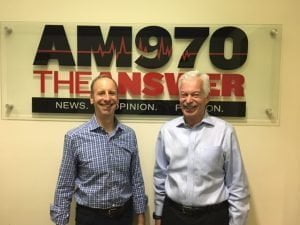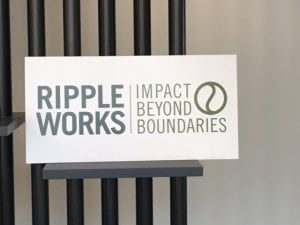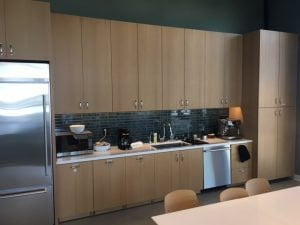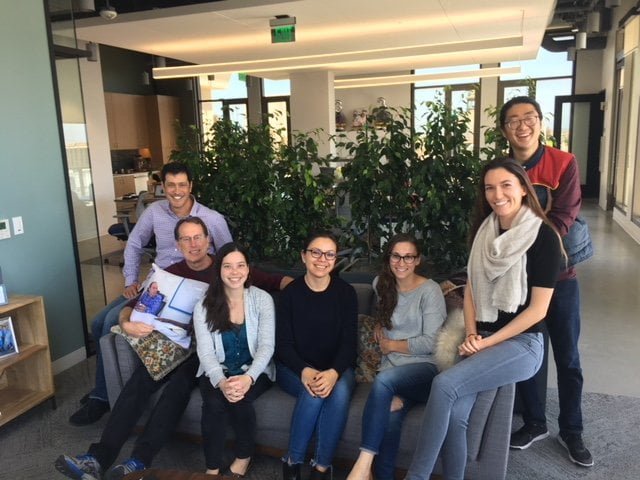Better Than Most is a regular feature of The Business of Giving, examining the best places to work among social good businesses and nonprofit organizations.
Denver: This evening, you will be heading out to Silicon Valley and to the brand new offices of RippleWorks in Redwood City. RippleWorks staffs pro-bono talent to help social good business from around the world to scale. We’ll start with Co-Founder and CEO Doug Galen and then you’ll hear from other members of the RippleWorks team.
 Doug: One of the best ways that we found to set a high bar of excellence is to create a safe place for feedback and a safe place to constantly learn and a safe place to always question if I can do a better job. So we do a whole host of things to create a safe place starting with daily stand up so we spend time together then weekly lunches where we have a lunch and learn, a monthly half days off where we go off and do something goofy. So never taking ourselves too seriously while constantly searching to do great is an awesome combo
Doug: One of the best ways that we found to set a high bar of excellence is to create a safe place for feedback and a safe place to constantly learn and a safe place to always question if I can do a better job. So we do a whole host of things to create a safe place starting with daily stand up so we spend time together then weekly lunches where we have a lunch and learn, a monthly half days off where we go off and do something goofy. So never taking ourselves too seriously while constantly searching to do great is an awesome combo
Tim: Just examples of that is, in put people first, we do something that we call First Friday. It’s time to just spend time with each other. Each month on the first Friday, one employee chooses an activity. They can share it with a group or have it as a surprise, and we take the afternoon, and we do that activity. We’ve done everything from playing cards at a restaurant to badminton to hundred-mile bike ride in a minivan, and Bollywood dancing. It’s a great tradition now that we all look forward to, I think.
Meagan: Actually, before you even start working at RippleWorks, you really feel appreciated by the team and really welcomed. Mostly everyone on the team had sent notes welcoming me before I even started. I’d also just moved into a new apartment, and the first package I ever received was from RippleWorks. I get home, and there is a box in front of the door, and it has a really nice personal note from Doug, our CEO with a book and RippleWorks mug and sweatshirt, and I work the sweatshirt all weekend before I started the job and got it so dirty that I couldn’t even wear it during my first week. I was so excited to join RippleWorks.
Sarah: What’s a fun thing that we do at work? Immediately came there with popsicles. As a part of a celebration for all of our projects that we close, there’s a popsicle stand that we go to at Brentwood City. Someone brings in popsicles that we close a project which now with three of us that are closing a projects, it’s getting a lot of popsicles.
 Lindsay: There were members from each functional area that stood up in front of the room and put their goals and on the slide in front of the room, and in I was surprised honestly to see that number of reds next to those goals. The key for me was the team’s response to that. There was no negative response. The response was, how can I help you do that? We pulled up a whiteboard. We brainstormed ideas. We talked about how everybody and each part of the organization was going to contribute to that person’s goal, and we did it right there. I think that really encourages open discussion, and I would say that if we went around the room now and brought up those same goals and we’re to color them, there would not be reds, and I think it’s that discussion that led to that.
Lindsay: There were members from each functional area that stood up in front of the room and put their goals and on the slide in front of the room, and in I was surprised honestly to see that number of reds next to those goals. The key for me was the team’s response to that. There was no negative response. The response was, how can I help you do that? We pulled up a whiteboard. We brainstormed ideas. We talked about how everybody and each part of the organization was going to contribute to that person’s goal, and we did it right there. I think that really encourages open discussion, and I would say that if we went around the room now and brought up those same goals and we’re to color them, there would not be reds, and I think it’s that discussion that led to that.
Rick: To the question of data driving the culture; if I were typing a response, I’d type OMG. We’re talking anecdotally about the impact we have on experts and clients, and a learning organization, and we’re people first, but we have metrics and we discuss numbers behind all of these stuff constantly. We collect stories but we drive ourselves with data.
Meagan: There’s a question about the biggest surprise that a new employee will experience about the work culture, I think one of the biggest surprises was how little I had to bring my lunch in the beginning. I was wondering if I ever needed to cook again.
Jay: We know that a great team culture, a great working environment doesn’t come top down, and it doesn’t stay stagnant. It will be really important for us to continue to evolve it. The reason I’m confident and I’m excited because our team culture is based on everyone having input on everything we do. That starts with Doug, our CEO who won’t let you off the hook without having a point of view and an opinion to share. That comes with us valuing everyone’s input no matter how long you’ve been here.
Sara: But I think what I was taken aback by was the commitment to examining our strategic goals and what we wanted to accomplish every day and what we’re always wanting to be improving upon and then working backwards from that, and the entire team coming around that objective and saying, how can we help, and how can we think through this? I’m really grateful for the way the team thinks about that and how everyone has incorporated it into their work.
 Tim: One of the things that impresses me about RippleWorks and what I love is how open we are just about everything. Two examples I have are, one is, our individual goals. They are there for everybody to see. You can go in to a drive, and you can see what my goals for the quarter are. I can go and see anybody else’s, and it’s just refreshing to know that we all know what they are, we can all see them, and it holds you accountable but it’s really nice that it’s just an open environment there. The other is that Doug recently has been going in and having a lot of conversations outside of RippleWorks with people at other foundations, and he’s just been open and transparent with what he’s learned, so he brings it back and literally in notes form and shares it with the team. Not that we have to be working on it but we just know what’s going on, and I feel like that’s for me it just really helps me, (a) understand what’s going on, but (b), just feel really feel included in everything.
Tim: One of the things that impresses me about RippleWorks and what I love is how open we are just about everything. Two examples I have are, one is, our individual goals. They are there for everybody to see. You can go in to a drive, and you can see what my goals for the quarter are. I can go and see anybody else’s, and it’s just refreshing to know that we all know what they are, we can all see them, and it holds you accountable but it’s really nice that it’s just an open environment there. The other is that Doug recently has been going in and having a lot of conversations outside of RippleWorks with people at other foundations, and he’s just been open and transparent with what he’s learned, so he brings it back and literally in notes form and shares it with the team. Not that we have to be working on it but we just know what’s going on, and I feel like that’s for me it just really helps me, (a) understand what’s going on, but (b), just feel really feel included in everything.
Sara Burch: The one thing would be, that our conference rooms were named after people’s dogs. That to me is an example of how we as a company encourage people to bring their full selves to work. People’s dogs, people’s families are part of our ethos. There is a very fluid nature to bringing your dog in to work, sharing stories about your kids, sharing stories about your weekend. And I think it goes back to how we embody that employee value proposition of people first.
Jay: We like having fun in the office. One way that it manifests itself is we love playing pranks on each other. That’s something that is common to a lot of workplaces but I would argue a different level especially in comparison to other teams so much so that it’s actually on all our job descriptions is that, anyone that we want to bring in not only needs to be comfortable in a team environment where we have fun and can joke around and can play pranks on one another but we actually value people who are great at it and are great at having fun and have great ideas for pranks and how to joke around.
Lindsay: I think each person here has agency in developing their own career path within RippleWorks. A couple of examples of that, we are responsible for our own improvement and that means going to everybody in the organization and asking for feedback and help all the time. We do that. The other one is, we define what we want to improve on next. We define our own goals, we also define a stretch project which is something that sits outside of our day-to-day activities that is meaningful to our ability to do our job better but is something that scope and execute with guidance from our teammates.

Denver: I wanna thank Shannon Galea for organizing my visit and to all those who participated in this segment: Tim Kunihiro, Lindsay Blodjett, Meagan Le, Sarah Burch, Sarah Johnson, and Rick Levenson. To hear this again, read the transcript or see pictures of the participants and the RippleWorks offices, simply come to denver-frederick.com and when you do, we’ll have a link there to my full interview with Doug Galen, the Co-Founder and CEO of RippleWorks.
The Business of Giving can be heard every Sunday evening between 6:00 p.m. and 7:00 p.m. Eastern on AM 970 The Answer in New York and on iHeartRadio. You can follow us @bizofgive on Twitter, @bizofgive on Instagram and at http://www.facebook.com/BusinessOfGiving

